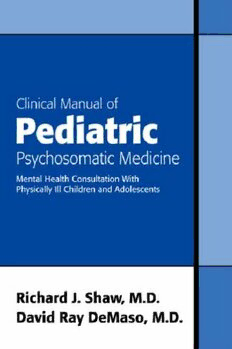
Clinical Manual of Pediatric Psychosomatic Medicine: Mental Health Consultation With Physically Ill Children And Adolescents PDF
426 Pages·2006·3.165 MB·English
Most books are stored in the elastic cloud where traffic is expensive. For this reason, we have a limit on daily download.
Preview Clinical Manual of Pediatric Psychosomatic Medicine: Mental Health Consultation With Physically Ill Children And Adolescents
Description:
The mental health assessment and treatment of youngsters with physical symptoms and illnesses commonly pose unique and often complex challenges to clinicians. Clinical Manual of Pediatric Psychosomatic Medicine is the only complete text on the subject, describing an integrative approach to behavioral health problems in children and adolescents who are physically ill, have emotional illness masquerading as physical illness, and have comorbid emotional and physical conditions that complicate the management of each. It brings together information regarding consultation-liaison or psychosomatic work with children into a succinct guide that provides the practitioner with pragmatic ways of organizing the key issues that arise in psychiatric consultation with physically ill children, and it features a set of unique templates to help guide clinical assessment and management. The authors offer a practical method of mental health consultation in the medical setting and cover topics not included in standard child psychiatry and psychology texts, such as treatment adherence and organ transplantation. Overview chapters include a hands-on approach to the consultation process and pragmatic assessment guidelines. Succeeding chapters then address specific clinical situations, from delirium and mood disorders to organ transplantation and cancer. Additional chapters consider issues related to treatment and intervention: both individual and family psychotherapy, including coping strategies for family members; psychopharmacology; and techniques such as medical hypnosis to help children prepare for procedures. Among the book's other helpful features are: -Templates with specific questions for both general psychiatric assessment and specific issues, such as pre-transplant assessment, treatment adherence, and somatoform disorders -Intensive coverage of pediatric pain assessment and management, including the use of adjunctive psychiatric medications to treat children with chronic pain -Unique considerations tailored to each topic, such as anxiety symptoms related to specific physical conditions and end-of-life strategies for cancer patients -Consideration of legal and forensic issues, including consent, confidentiality, and assessment for parenting capacity -An abundance of quick-reference tablesAincluding psychopharmacological agents used in a wide range of conditions, with indications, doses, and side effectsAand flow charts describing step-by-step approaches to pain and somatoform disorders This practical manual is useful to a wide range of professionals who work with children and adolescents in medical settings. And because psychosomatic medicine has recently received subspecialty status with the American Board of Psychiatry and Neurology, it offers an excellent resource for board examinations.
See more
The list of books you might like
Most books are stored in the elastic cloud where traffic is expensive. For this reason, we have a limit on daily download.
